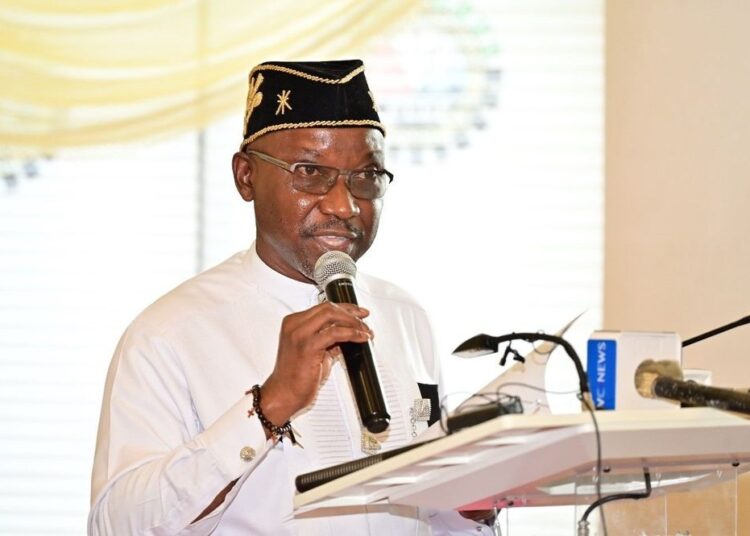
Minister of State, Petroleum Resources (Gas), Hon. Ekperipe Ekpo
There are immediate considerations by the government towards enhancing power-to-gas initiative in a deliberate approach not only to harness the country’s abundant gas reserves but to push up electricity generation.
Minister of state for Petroleum Resources (Gas), Ekperikpe Ekpo said, the revitalisation of the initiative will mark a strategic shift in the country’s approach to harnessing its abundant natural gas resources.
This initiative is designed to enhance electricity generation, foster economic development, and boost Nigeria’s global competitiveness by focusing on the comprehensive development and utilisation of gas resources.
The government aims to address chronic electricity shortages, stimulate industrial growth, and promote cleaner energy solutions by prioritising domestic gas utilisation and investing in critical infrastructure.
With approximately 209 trillion cubic feet of proven gas reserves, Nigeria is poised to transform its energy landscape.
This initiative also includes strengthening local content and capacity building, expanding liquefied natural gas exports, and supporting compressed natural gas projects for transportation.
These efforts are meant to create a sustainable and prosperous energy future, aligning with global trends toward cleaner and more efficient energy sources.
The focus on promoting domestic gas utilisation is pivotal for addressing Nigeria’s long-standing electricity generation challenges. By prioritising gas-to-power projects, the government aims to ensure a reliable and sustainable electricity supply, which is crucial for economic stability and growth. Gas-to-power projects offer an efficient way to convert Nigeria’s abundant natural gas reserves into electricity, which could significantly reduce power shortages and increase access to energy across the country.
The Minister highlighted the government’s commitment to developing critical gas infrastructure. This includes the transportation and distribution of natural gas nationwide, enabling its use in industrial applications and transportation.
Investing in infrastructure is essential for the seamless movement of gas from production sites to end-users, ensuring consistent supply and facilitating industrial growth.
Nigeria, he said, is well-positioned to utilise its natural gas resources for economic development, noting that, effectively harnessing these reserves can drive industrialization, reduce oil dependency, and enhance energy security.
The minister’s focus on gas resources aligns with global trends toward cleaner energy and positions Nigeria as a leader in transitioning to a low-carbon economy.
By capitalising on its vast reserves, he said, Nigeria can foster sustainable growth and significantly contribute to global efforts to reduce carbon emissions, securing its place in the future of clean energy.
Ekpo also harped on strengthening the Nigerian Content Development and Monitoring Board (NCDMB) which is a strategic move to enhance local capacity and enforce local content policies.
This focus on local content, he stressed, ensures that Nigerians benefit directly from the country’s natural resources through job creation, skill development, and the growth of local industries.
The NCDMB’s efforts to promote local content are evidenced by its significant investments in gas projects and infrastructure.
Expanding Nigeria’s LNG export capacity is vital to the initiative, positioning the country as a key player in the global gas market. This strategy promises to generate significant revenue, attract foreign investment, and boost Nigeria’s geopolitical influence.
The minister’s emphasis on Compressed Natural Gas (CNG) projects highlights the government’s strategy to reduce transportation costs and lower the overall cost of living.
The CNG serves as a cleaner, more affordable alternative to traditional fuels, aligning with global efforts to cut carbon emissions and combat climate change.
By investing in CNG infrastructure, Nigeria aims to make transportation more economical and environmentally friendly, which can significantly improve air quality across the country.
This focus on CNG is a forward-thinking approach that not only addresses environmental concerns but also supports sustainable economic growth by making energy more accessible and cost-effective for consumers.
The rejigging of Nigeria’s gas-to-power initiative represents a comprehensive strategy to utilise the country’s vast gas resources for sustainable economic growth.
By focusing on domestic utilisation, infrastructure development, local content, and global market expansion, Nigeria aims to enhance electricity generation, reduce costs, and position itself as a leader in the global gas market.
This initiative holds promise for transforming Nigeria’s energy landscape, improving living standards, and driving industrial development.
The government’s strategic focus on gas resources is a forward-thinking approach that could yield significant long-term benefits for Nigeria and its people.
Copied
